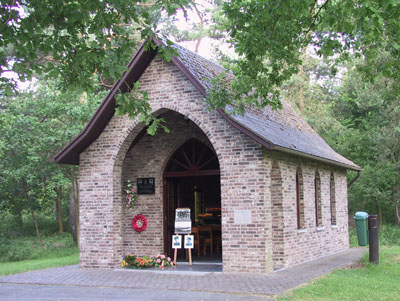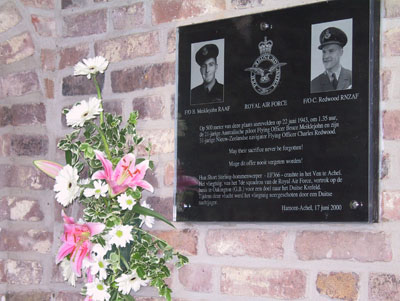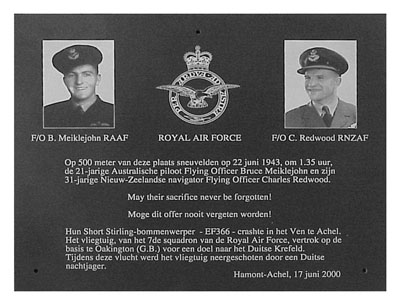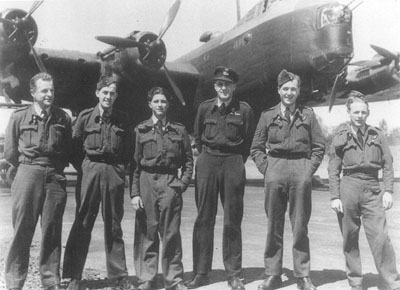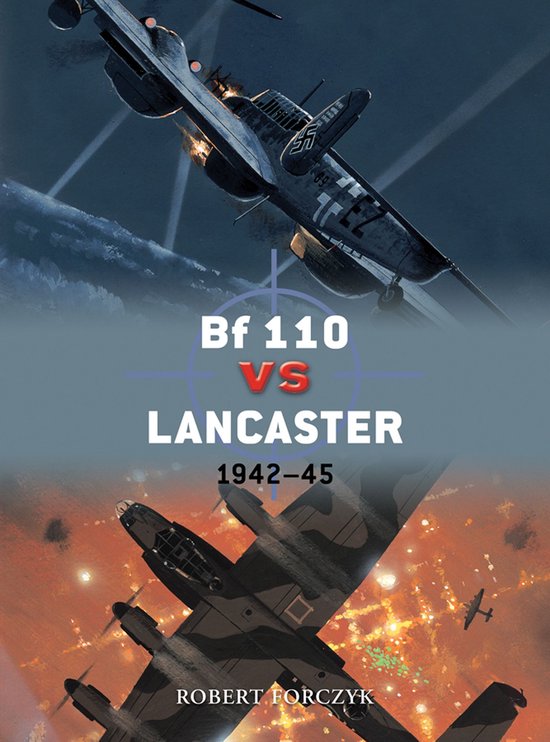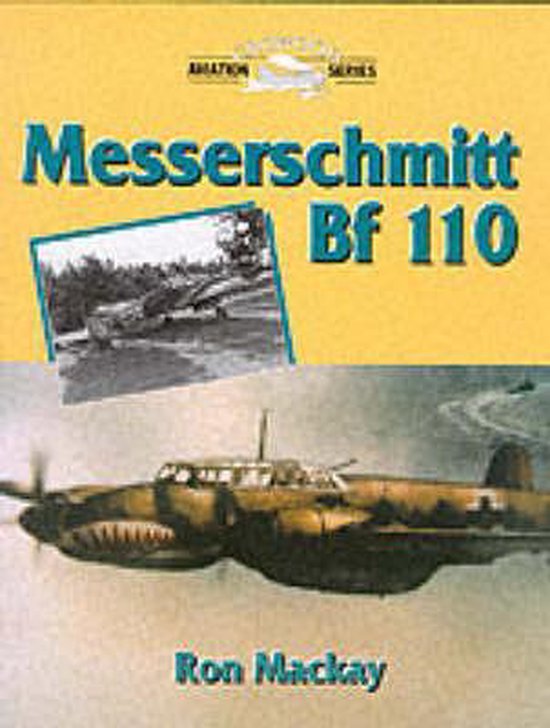Memorial Stirling EF366
During the night of 21 to 22 June 1943 the 4 engined Stirling EF-366 was shot down. The aircraft took off at 00:07 from the British aerodrome of Oakington. It belonged to 7th Squadron. Around 01:35 the bomber crashed in the hamlet of ‘Het Ven’ in Hamont Achel in Flanders in Belgium still equipped with its bombload.
The Stirling EF-366 belonged to a group of aircraft that guided the bombers of the Royal Air Force to their targets. Their order was to mark a way point at the south east of the Dutch town of Eindhoven. After that turning point the main force of the bomber fleet had to carry out a bombing raid on the German town of Krefeld.
The crew of the Stirling got into a dogfight with two German night fighters. The enemy had discovered the shadow of the bomber above the light markers.
At an altitude of 10.000 ft the British plane was seriously hit. The pilot ordered the crew to abandon the aircraft. The aircraft was spinning and the centrifugal forces were so strong that the men could hardly move. The pilot, the Australian, Flying Officer Robert Bruce Meiklejohn, remained at the controls until he was sure that everybody had escaped. When the aircraft screamed towards the ground and the centre of the village of Achel, he succeeded in raising the nose of the aircraft. With this ultimate effort the pilot prohibited the aircraft from crashing in the centre of this village. Lots of residents of Achel witnessed this nightly crash.
Not only five crewmembers but also a significant number of residents of the centre of Achel are to be grateful for saving their lives to the pilot Robert Bruce Meiklejohn. Together with the Navigator Charles Redwood from New Zealand he died that night in the crashing aircraft. Both have been buried on the British military graveyard of Heverlee (Louven).
The Stirling was downed by the German Hauptmann Siegfried Wandam. A few weeks after his siege over the bomber his aircraft was shot down over the village of Hoepertingen in Limburg. He died on July 4th, 1943, in his Bf 110 together with Bordfunker Fw. Schöpke. Both have been buried on the German military graveyard in Lommel.
Five crewmembers of the Stirling EF-366 ended in the hands of the Germans.
Crew of the Stirling EF-366:
- Navigator Charles Redwood (RNZAF), 31 years of age from New Zealand;
- Bomb Aimer Frank Hugo (RAF), from England: he landed safely with his parachute in Neerpelt. Captured by the Germans during his escape in Paris.
- Wireless Operator Les Ellingham, (RAF), from England, landed safely near the area of the crash. During his escape, captured by the Germans in Paris.
- Pilot Robert Bruce Meiklejohn(RAAF), Australian 21 years of age, was killed in the crash landing.
- Mid-upper Gunner Jack Killfoyle (RAF), from England, received heavy injuries during his parachute landing. He was taken by the Germans, through the railway station of Achel-Statie to the military hospital of Leopoldsburg to be taken care of. Thereafter he remained prisoner of war for the duration of the war.
- Flight Engineer Bill Cole (RAF) from England. He safely landed by parachute in Neerpelt. During his escape, he was captured by the Germans in Paris.
- Tail Gunner Edgar Brown (RNZAF), from New Zealand. He got heavily injured during his parachute landing close to the area of the crash. He was taken by the Germans, through the railway station of Achel-Statie to the military hospital of Leopoldsburg to be taken care of. Thereafter he remained prisoner of war for the duration of the war.
Do you have more information about this location? Inform us!
Source
- Text: Peter Loncke
- Photos: René Winters & Peter Loncke
Related books
Nearby
Museum
Point of interest
- Information Signs Simonspark - Achel (Hamont-Achel)
- Reconstruction De Doodendraad Achelse Kluis - Achel (Hamont-Achel)
- Reconstruction Den Doodendraad Hamont-Achel - Hamont-Achel
Monument
- Memorial Train Sabotage June 1944 - Hamont-Achel
- War Memorial Achel - Hamont-Achel
- Memorial Lancaster ED629 - Neerpelt (Pelt)
Cemetery
- Belgian Graves Veterans Achel - Achel (Hamont-Achel)
- Commonwealth War Graves Neerpelt - Neerpelt (Pelt)
- Belgian War Graves Neerpelt - Neerpelt (Pelt)
Fortification
- Bunker 16 Border Defence Bocholt-Herentals Canal - Pelt
- Bunker 17 Border Defence Bocholt-Herentals Canal - Pelt
- Bunker 14 Border Defence Bocholt-Herentals Canal - Neerpelt
